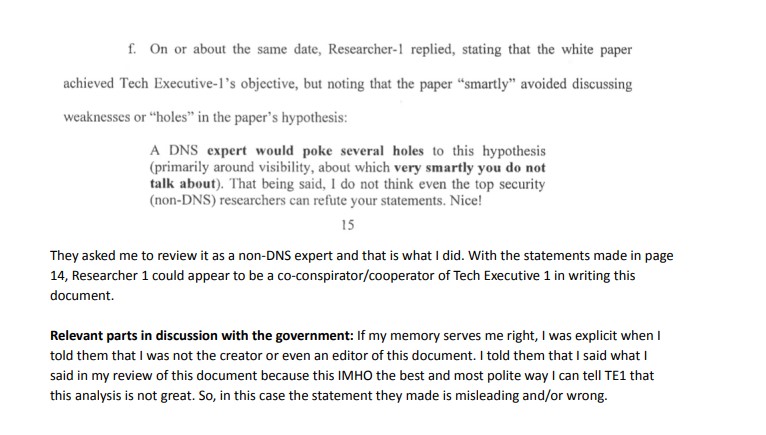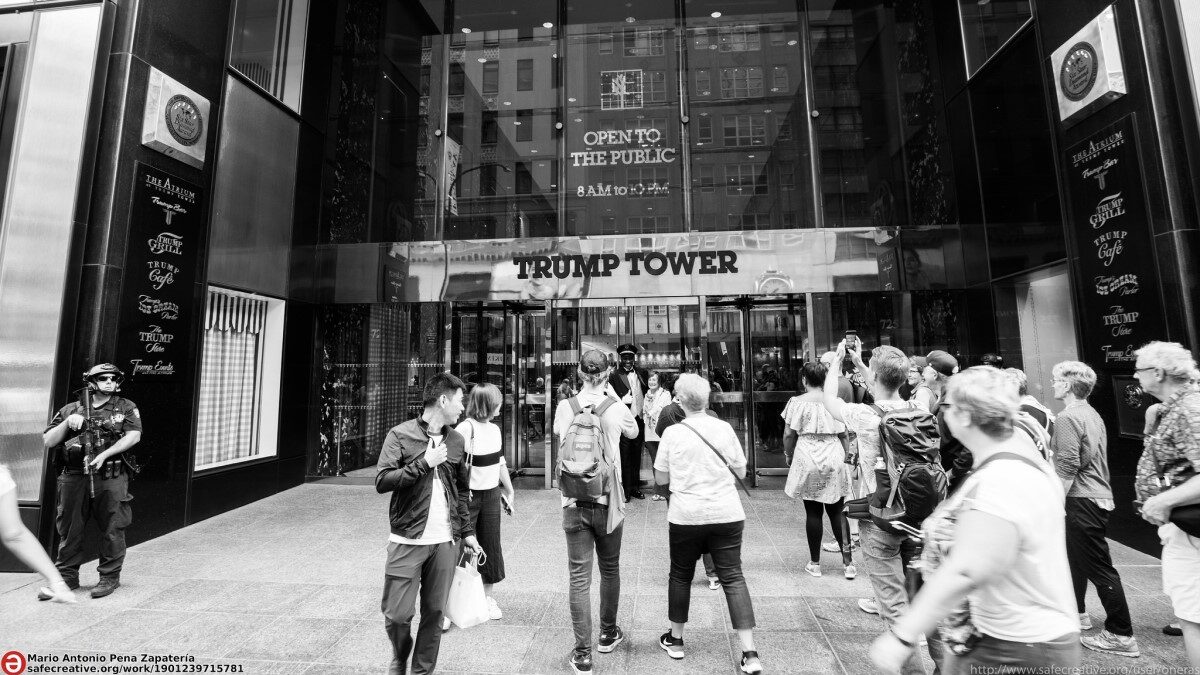A Georgia Tech researcher says he tried to politely throw cold water on a key part of the Russia collusion hoax before the Alfa Bank lie was eventually shopped to the media and government agencies, according to a newly obtained document. This new detail was one of several revealed in a document drafted by George Tech’s Manos Antonakakis—the man branded “Researcher-1” in Special Counsel John Durham’s indictment of Michael Sussmann on one count of lying to FBI General Counsel James Baker.
As I explained previously, “that indictment alleged that when Sussmann met with Baker on September 19, 2016, to provide the FBI attorney with data and ‘white papers’ that purported to establish a secret communication channel between the Trump organization and the Russia-connected Alfa Bank, Sussmann falsely claimed he was not acting on behalf of a client, when in reality Sussmann was working both for the Clinton campaign and an unnamed ‘U.S. technology industry executive’ since confirmed to be Rodney Joffe.”
After the Sussmann indictment dropped, Antonakakis emailed his private lawyers and an attorney and higher-ups at Georgia Tech a document entitled “fallacies” that purported to identify several portions of the indictment he claimed are false or misleading. Last week, The Federalist reported on several details contained in an abbreviated version of the “fallacies” document obtained from Georgia Tech pursuant to a Right-to-Know request.
On Thursday, The Federalist received a more complete version of the summary drafted by Antonakakis two days after news broke of Sussmann’s indictment. That version included Antonakakis’s synopsis of what he told Durham’s team about the Alfa Bank hoax.
“This part has been taken out of context,” Antonakakis wrote of the indictment’s excerpt from an email he had sent to Joffe after reviewing a draft white paper laying out the Alfa Bank-Trump theory. That excerpt to Joffe read: “A DNS expert would poke several holes to this hypothesis (primarily around visibility, about which very smartly you do not talk about). That being said, I do not think even the top security (non-DNS) researcher can refute your statements. Nice!”

Antonakakis initially countered that he was asked “to review it as a non-DNS expert and that is what I did,” before explaining what he had told the special counsel.
“If my memory serves me right,” Antonakakis wrote, “I was explicit when I told them that I was not the creator or even an editor of this document.” “I told them that I said what I said in my review of this document,” Antonakakis continued, “because this IMHO [was] the best and most polite way I can tell [Joffe] that this analysis is not great.”
So, according to Antonakakis, it was manners that caused him to tell Joffe he “very smartly” did not discuss the main “hole” in the Alfa Bank analysis. It was also proper deportment that compelled the Georgia Tech expert to exclaim “Nice!” to the fact that “even the top security (non-DNS) researchers” would be unable to refute Joffe’s statements.
Last week’s cache of documents is not the first to confirm that Antonakakis had rejected the Alfa Bank-Trump secret communication network theory posited in the white paper Sussmann later presented to the FBI’s general counsel. In an earlier email obtained from Georgia Tech, Antonakakis wrote that “Researcher 1,” as Antonakakis called himself, “never supported the article.”
The tone and tenor of these emails mimic those excerpted in the Sussmann indictment that likewise show Antonakakis found the Alfa Bank theory half-baked. For instance, after Antonakakis found no connections between the trump-email.com domain and Russia when he ran a search for the domain, he provided his frank feedback that the results do “not make much sense with the storyline you have.”
Antonakakis would later tell Joffe, Lorenzen, and Researcher 2, who was his Georgia Tech colleague David Dagon, that they needed to regroup because their dislike for Trump was giving them “tunnel vision” and their theory would not withstand public scrutiny.
While in private and when questioned by a federal prosecutor Antonakakis presented a dim assessment of the Alfa Bank-Trump theory, an attorney representing the Georgia Tech researcher framed “their hypothesis” as remaining, “to this day,” “a plausible working theory.” Antonakakis has also remained mum since the indictment dropped, even as other supposed experts continue to push the Alfa Bank theory. But why?
The indictment, when read in light of the numerous documents obtained from Georgia Tech, indicates the Alfa Bank data presented to Baker (and later the CIA) came from outside of Georgia Tech. It shows Antonakakis saying “these datasets apparently have originated from April,” an apparent reference to April Lorenzen, whom the Sussmann indictment called the “Originator.” Georgia Tech “did not pay or use these data in any of our programs,” Antonakakis would write, which is also consistent with the allegations in the Sussmann indictment.
Antonakakis also appears to have had no role in compiling the data, conceptualizing the Alfa Bank theory, writing the report, or editing it. Rather, Antonakakis’s involvement seems limited to “querying” internet data maintained by Joffe’s internet company on August 19, 2016, which led him to believe the “storyline” “does not make much sense,” and reviewing Joffe’s draft report and providing feedback to Joffe, albeit while seemingly cheering on Joffe’s ability to hide the holes in the report.
Nor is there any indication that Antonakakis knew that Joffe, with Sussmann’s help, intended to present the report to the FBI, CIA, and media. In contrast, the Sussmann indictment alleged that Dagon, after reviewing Joffe’s draft paper, noted that while questions remained, “in substance and in part, that the paper should be shared with government officials.”
The Sussmann indictment also alleged that Dagon, identified as Researcher-2 in the indictment, had also drafted a white paper apparently related to the Alfa Bank allegations Sussmann provided to the FBI. Additionally, Sussmann asked Dagon to “speak on background with members of the media” regarding the Alfa Bank allegation, which Dagon did, the indictment alleged.
The special counsel’s office made no similar allegations about Antonakakis. So why doesn’t Antonakakis go public with his expert analysis that the Alfa Bank-Trump research was “not great”? Why not “poke holes” in the white paper, as he said a DNS expert could easily do?
Is it a misplaced loyalty to his colleagues and a fear that frankness will create more problems for Joffe, Dagon, and Lorenzen? Or is his attorney, who previously represented Christopher Steele’s Primary Sub-Source, Igor Danchenko, driving the “Alfa Bank-Trump theory remains plausible” strategy?
No matter the answer, we know the Alfa Bank paper was bunk, and the foremost expert in DNS analysis knows it too.









